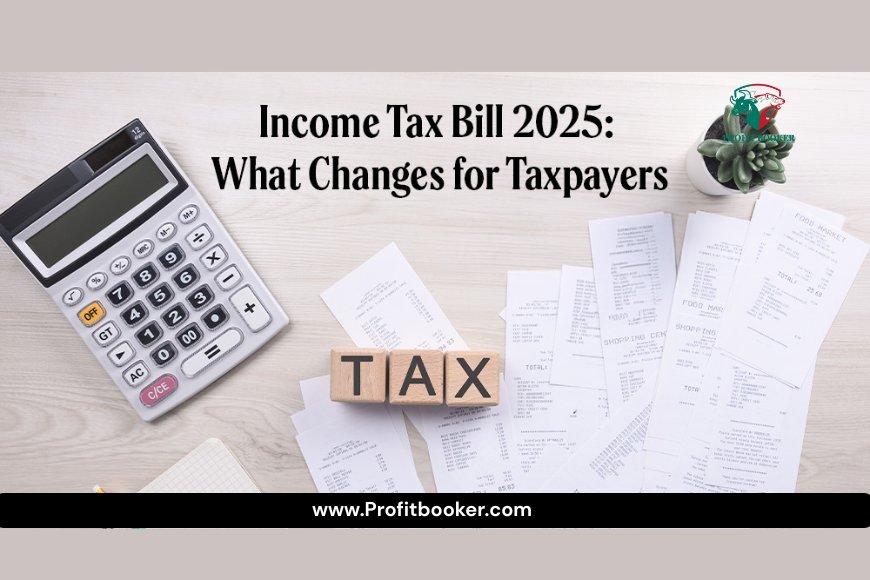Income Tax Bill 2025: Key Changes, Impact & Complete Guide for Taxpayers
The Income Tax Bill 2025 introduces major reforms in India’s tax system, aiming to simplify compliance, enhance transparency, and boost economic growth. This bill proposes changes in tax slabs, digital filing processes, exemptions, and corporate tax structures to make taxation more efficient for individuals and businesses. It also emphasizes reducing litigation and improving dispute resolution mechanisms. With provisions for better digital integration, the bill aims to curb tax evasion and promote voluntary compliance. This detailed guide covers the bill’s key highlights, benefits, challenges, and its potential impact on taxpayers, salaried employees, small businesses, and the overall economy.

The Income Tax Bill 2025 has been one of the most discussed topics in financial and economic circles this year. With India’s economy undergoing rapid transformation, the government has introduced several key reforms in the tax structure to simplify compliance, widen the tax base, and ensure fairness in tax collection.
This article will break down everything you need to know about the Income Tax Bill 2025 — new tax slabs, exemptions, deductions, compliance rules, and its impact on individuals, businesses, and the economy. Whether you are a salaried employee, a business owner, or an investor, these changes could directly affect your financial planning.
1. Overview of the Income Tax Bill 2025
The Income Tax Bill 2025 is aimed at:
-
Simplifying the taxation process for individuals and corporations.
-
Promoting transparency and reducing tax evasion.
-
Boosting compliance through digital-first approaches.
-
Encouraging investments by offering targeted tax incentives.
Finance Minister [Insert Name], while presenting the bill in Parliament, stated that this reform is a step towards making India’s taxation system globally competitive, while still ensuring revenue stability for government welfare and infrastructure programs.
2. Why the Bill Was Introduced
There are three major reasons for introducing this bill in 2025:
-
Economic Growth Demands: With India targeting a $5 trillion economy, the government aims to reduce tax-related bottlenecks and attract foreign investment.
-
Simplification: Current tax laws are complex, leading to confusion and high compliance costs.
-
Digital Economy Adaptation: The bill addresses taxation in emerging sectors like cryptocurrencies, gig economy platforms, and e-commerce.
3. Key Changes in the Income Tax Bill 2025
Let’s break down the major changes:
a) New Income Tax Slabs for Individuals
The government has revised income tax slabs under the new tax regime to make it more attractive for taxpayers.
| Annual Income | Tax Rate (New Regime) |
|---|---|
| Up to ₹3 lakh | Nil |
| ₹3 lakh – ₹7 lakh | 5% |
| ₹7 lakh – ₹10 lakh | 10% |
| ₹10 lakh – ₹15 lakh | 15% |
| Above ₹15 lakh | 25% |
Notable Points:
-
The standard deduction has been increased from ₹50,000 to ₹75,000.
-
Rebate under Section 87A has been increased for incomes up to ₹7 lakh (effectively zero tax).
b) Corporate Tax Changes
-
Domestic companies: Base corporate tax reduced from 25% to 22%.
-
New manufacturing companies set up after April 2025: Concessional tax rate of 15% continues.
-
Introduction of Green Investment Tax Credits for companies investing in renewable energy.
c) Digital Economy Taxation
-
Crypto Gains Tax: Flat 20% tax on profits from cryptocurrency and other virtual digital assets, with no set-off against other income.
-
E-commerce Sellers: TDS reduced from 1% to 0.5% for small sellers (turnover < ₹50 lakh).
d) Higher Penalties for Tax Evasion
-
Penalty for willful evasion increased to 200% of the tax due.
-
Repeat offenders may face prosecution and imprisonment.
e) Senior Citizens Benefits
-
For individuals above 60 years, exemption limit increased from ₹3 lakh to ₹5 lakh.
-
Interest income exemption under Section 80TTB increased from ₹50,000 to ₹75,000.
4. Deductions & Exemptions: What’s New?
The Income Tax Bill 2025 keeps most popular deductions but modifies some limits:
-
Section 80C: Limit remains at ₹1.5 lakh.
-
Section 80D (Health Insurance): Increased to ₹30,000 for individuals and ₹60,000 for senior citizens.
-
Section 24 (Home Loan Interest): Deduction increased from ₹2 lakh to ₹2.5 lakh.
-
Section 80E (Education Loan Interest): No change.
5. Impact on Different Taxpayer Groups
a) Salaried Employees
-
Higher standard deduction means more take-home pay.
-
Middle-class earners (₹7–15 lakh) benefit the most from slab revisions.
b) Businesses
-
Corporate tax cuts and digital compliance systems reduce administrative burden.
-
MSMEs benefit from lower e-commerce TDS rates.
c) Investors
-
Stock market gains still taxed under existing capital gains rules, but crypto investors now face a higher flat tax.
d) Senior Citizens
-
Higher exemption limits and interest income deductions mean reduced tax liability.
6. Compliance & Filing Changes
The bill aims to fully digitize tax filing:
-
Pre-filled ITR forms with salary, interest, and investment data.
-
Facial recognition-based e-verification.
-
Faster refunds within 7 working days.
7. Possible Challenges
While the bill brings many benefits, some challenges remain:
-
Crypto taxation could discourage innovation in blockchain startups.
-
Higher penalties might create fear among small taxpayers.
-
Some feel the deductions should have been raised more significantly to counter inflation.
8. Economic Impact
Experts believe the Income Tax Bill 2025 will:
-
Increase disposable income for middle-class families.
-
Boost domestic investment through tax cuts.
-
Improve India’s Ease of Doing Business ranking.
-
Increase government tax revenue due to better compliance.
9. Expert Opinions
-
CA Ramesh Mehta: “This bill is a balanced mix of relief and enforcement. While taxpayers benefit from slab changes, the government ensures compliance through strict penalties.”
-
Economist Priya Sharma: “Lower corporate tax rates are a good move to attract investment, but digital economy taxation should be monitored for long-term effects.”
10. Final Thoughts
The Income Tax Bill 2025 marks a significant milestone in India’s taxation journey. By making the tax system simpler, more transparent, and aligned with modern economic realities, it attempts to balance the needs of taxpayers with the revenue requirements of the government.
For taxpayers, understanding the new rules and planning accordingly is key to maximizing benefits and avoiding penalties.
Pro Tip: File your returns early, keep digital records of all transactions, and consult a tax advisor to optimize your tax savings under the new regime.
If you want, I can now make you:
-
Meta title, description, and keywords (HTML format) for SEO
-
A table summarizing the tax changes for quick reference
-
A PDF version of this blog for direct publishing
Do you want me to prepare that now?




